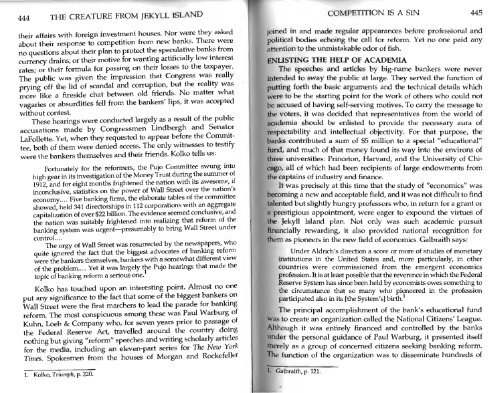Create successful ePaper yourself
Turn your PDF publications into a flip-book with our unique Google optimized e-Paper software.
1<br />
It<br />
444 THE CREATURE FROM JEKYLL ISLAND COMPETITION IS A SIN 445<br />
their affairs with foreign investment houses. Nor were they asked<br />
about their response to competition from new banks. There were<br />
no questions about their plan to protect the speculative banks from<br />
currency drains; or their motive for wanting artificially low interest<br />
rates; or their formula for passing on their losses to the taxpayer.<br />
The public was given the impression that Congress was really<br />
prying off the lid of scandal and corruption, but the reality was<br />
more like a fireside chat between old friends. No matter what<br />
vagaries or absurdities fell from the bankers' lips, it was accepted<br />
without contest.<br />
These hearings were conducted largely as a result of the public<br />
accusations made by Congressmen Lindbergh and Senator<br />
LaFollette. Yet, when they requested to appear before the Committee,<br />
both of them were denied access. The only witnesses to testify<br />
were the bankers themselves and their friends. Kolko tells us:<br />
Fortunately for the reformers, the Pujo Committee swung into<br />
high gear in its investigation of the Money Trust during the summer of<br />
1912 and for eight months frightened the nation with its awesome, if<br />
inconclusive, statistics on the power of Wall Street over the nation's<br />
economy.... Five banking firms, the elaborate tables of the committee<br />
showed, held 341 directorships in 112 corporations with an aggregate<br />
capitalization of over $22 billion. The evidence seemed conclusive, and<br />
the nation was suitably frightened into realizing that reform of the<br />
banking system was urgent—presumably to bring Wall Street under<br />
control....<br />
The orgy of Wall Street was resurrected by the newspapers, who<br />
quite ignored the fact that the biggest advocates of banking reform<br />
were the bankers themselves, bankers with a somewhat different view<br />
of the problem.... Yet it was largely the Pujo hearings that made the<br />
topic of banking reform a serious one.<br />
Kolko has touched upon an interesting point. Almost no one<br />
put any significance to the fact that some of the biggest bankers on<br />
Wall Street were the first marchers to lead the parade for banking<br />
reform. The most conspicuous among these was Paul Warburg of<br />
Kuhn, Loeb & Company who, for seven years prior to passage of<br />
the Federal Reserve Act, travelled around the country doing<br />
nothing but giving "reform" speeches and writing scholarly articles<br />
for the media, including an eleven-part series for The New York<br />
Times. Spokesmen from the houses of Morgan and Rockefeller<br />
joined in and made regular appearances before professional and<br />
political bodies echoing the call<br />
attention to the unmistakable odor of fish.<br />
for reform. Yet no one paid any<br />
ENLISTING THE HELP OF ACADEMIA<br />
The speeches and articles by big-name bankers were never<br />
intended to sway the public at large. They served the function of<br />
putting forth the basic arguments and the technical details which<br />
were to be the starting point for the work of others who could not<br />
be accused of having self-serving motives. To carry the message to<br />
the voters, it was decided that representatives from the world of<br />
academia should be enlisted to provide the necessary aura of<br />
respectability and intellectual objectivity. For that purpose, the<br />
banks contributed a sum of $5 million to a special "educational"<br />
fund, and much of that money found its way into the environs of<br />
three universities: Princeton, Harvard, and the University of Chicago,<br />
all of which had been recipients of large endowments from<br />
the captains of industry and finance.<br />
was precisely at this time that the study of "economics" was<br />
becoming a new and acceptable field, and it was not difficult to find<br />
talented but slightly hungry professors who, in return for a grant or<br />
a prestigious appointment, were eager to expound the virtues of<br />
the <strong>Jekyll</strong> Island plan. Not only was such academic pursuit<br />
financially rewarding, it also provided national recognition for<br />
them as pioneers in the new field of economics. Galbraith says:<br />
Under Aldrich's direction a score or more of studies of monetary<br />
institutions in the United States and, more particularly, in other<br />
countries were commissioned from the emergent economics<br />
profession. It is at least possible that the reverence in which the Federal<br />
Reserve System has since been held by economists owes something to<br />
the circumstance that so many who pioneered in the profession<br />
participated also in its [the System's] birth.<br />
The principal accomplishment of the bank's educational fund<br />
Was to create an organization called the National Citizens' League.<br />
Although it was entirely financed and controlled by the banks<br />
under the personal guidance of Paul Warburg, it presented itself<br />
merely as a group of concerned citizens seeking banking reform.<br />
The function of the organization was to disseminate hundreds of<br />
1. Kolko, Triumph, p. 220.<br />
|<br />
Galbraith, p. 121.


